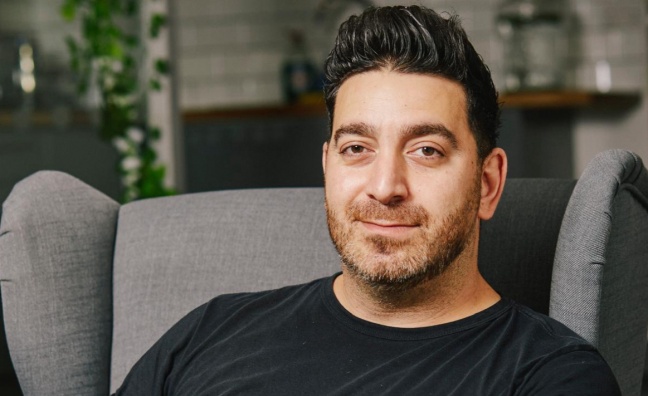Lickd is the world’s largest commercial music licensing platform for creators, offering more than 1.4 million tracks.
While the music industry is opening up new revenue streams for the creator economy, Lickd founder & CEO Paul Sampson calls for more to be done to democratise licensing…
Let me hit you with a stat: at Lickd, we’ve got the largest library of commercial music globally, with over 1.4 million tracks available to creators. We’ve seen our licensed music boost content performance by as much as 75% – more engagement, more likes, more views. These numbers speak for themselves, but here’s the real question: is the music industry at a stage where it is now doing enough for content creators? And are content creators recognising that this is a two-way street?
The creator economy is booming, but let’s not pretend it’s easy. You’ve got to be an artist, a marketer, and an entrepreneur, all rolled into one. And while the music industry is opening up some new revenue streams, I can’t help but ask – are they doing it fast enough? Are they truly making music accessible, or are they still holding onto outdated models that make it harder for content creators such as YouTubers to thrive and for artists to generate more income?
Monetisation: Is the music industry doing its part?
Yes, the industry is unlocking more ways to monetise content – sync deals, branded collaborations, music subscription services, AI tools – but are these options reaching creators at all levels? The truth is, while some platforms are stepping up, others are lagging behind, and it’s the independent creators who are feeling the impact.
It's clear that AI is transforming how creators engage with music. Tools like AIVA and Melodia are making it easier for creators to produce, remix and customise music without needing expensive studios or live musicians. But AI alone isn’t the solution – it’s part of a broader shift that needs to happen in the industry. The question creators should be asking is, why isn’t access to music and these tools even easier? UGC is the largest and fastest growing production sector in the world and, in not moving fast enough to cater to it, the music industry is self-harming. It needs to speed up and creators need to demand more because at the end of the day, it's a quid pro quo relationship.
Licensing: Still a challenge?
Let’s talk licensing. Gone are the days when you needed a massive budget to get access to commercial tracks. Platforms like Lickd are democratising music licensing, but let’s be honest – this wasn’t always the case. The industry has been slow to adapt. Just look at the challenges with TikTok and Universal Music Group where TikTok temporarily lost access to UMG’s catalogue because of disputes over compensation. It’s great that they patched things up and UMG has every right to demand what it thinks is fair compensation from these billion dollar platforms, but it only highlights a deeper issue: the balance between platforms, labels, and fair compensation is fragile.
The music industry needs to do more, and creators need to leverage the fact that they’re part of a value exchange
Paul Sampson
And it's not just individual content creators. We’ve seen huge companies get it wrong too – for example, 14 NBA teams are currently being sued by the majors for use of their music on social media platforms without permission. If even the big guys can get it wrong, where does that leave smaller creators who are trying to navigate these murky waters? We need clearer, more accessible solutions for everyone.
Creators, are you playing your part?
Now, content creators, let me turn the spotlight on you for a second. You can’t expect to use popular music, build engagement, and boost your brand without recognising that there’s a value exchange here. You want the music? Then get on board with the process – and to be clear, lots of creators have already realised the benefits. It’s not about freebies – it’s about recognising the ecosystem of which you are a part. When creators use licensed music, it’s a win-win. You get the music that resonates with your audience, and the artists get fairly compensated for their work.
Music is your community-building tool – use it!
Music can be an incredibly useful tool to build your community and forge deeper connections with your audience. The right song can elevate your content from "good" to "unforgettable." At Lickd, we see it all the time – creators who tap into the emotional power of music end up building loyalty and trust with their viewers.
If you’re a creator and you’re not leveraging music to its fullest potential, you’re missing out. The data proves it: adding familiar, licensed tracks can boost general engagement by 14% and, within certain sectors like gaming, engagement can increase by up to 75%. They are not small numbers. And it’s not just about YouTube – this applies to all platforms. The creators who recognise this value and invest in it are the ones who will stand out in the noise.
The bottom line
The music industry needs to do more, and creators need to leverage the fact that they’re part of a value exchange. It’s not enough to rely on what’s been handed to you – creators need to push the industry to continue evolving, and the industry needs to respond by making access to music easier, clearer and more affordable.
The next time you use a track for your video or content, remember – you’re part of a bigger system. The tools are there to help you thrive, but only if you maximise the give-and-take nature of this relationship. Let’s keep pushing forward, and let’s make sure the music industry is supporting creators at every level – not just the ones with big budgets.












